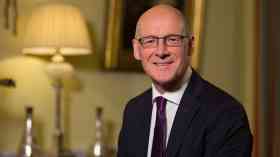Sue Robb of 4Children talks to Julie Laughton and Alison Britton from the Department for Education about the role of childminders in delivering the 30 hours free entitlement.
Three Scottish councils ‘running out of reserves’

Three Scottish councils could run out of their cash reserves within three years, the public spending watchdog has said.
Moray, Clackmannanshire and North Ayrshire face running out of spare money for emergencies, the Accounts Commission found.
Overall, the commission said the amount of funds pledged by the Scottish government was down by 7.6 per cent in real terms from 2010-11.
In 2016-17, a total of 19 councils used cash for their revenue reserves - up from the eight authorities that did this in 2015-16.
Over the course of the year, the overall amount held in council ‘rainy day funds’ fell by £32 million.
The commission said councils who were using reserves faced having to identify larger savings in 2018-19.
It said Clackmannanshire, Moray and North Ayrshire councils would use up their General Fund reserves within two to three years if they continued to use them at the level planned for 2017-18.
Scottish government funding for councils amounted to £9.7 billion in 2016-17, with ministers also giving £250 million from the health budget to support the integration of health and social care services.
But the Accounts Commission said that even taking this into account, total revenue funding for councils fell in 2016-17.
A report from the Accounts Commission reveals the financial situation facing Scotland’s 32 councils: councils made £524 million of savings in 2016-17 but were finding it increasingly difficult to identify and deliver savings; a rising proportion of council funding is being directed towards national priorities, meaning councils have to look at deeper cuts in other services; and overall council debt increased to £836 million as councils were taking advantage of low interest rates to borrow more to invest in larger capital programmes.
According to the Accounts Commission report, the funding provided by the Scottish government fell by 5.2 per cent in 2016-17.
Its report said culture, planning and development and local roads have seen the sharpest falls in funding over the past three year.
The report notes that if all councils chose to raise council tax by three per cent, it would only bring in £68 million.
Derek MacKay, Finance Secretary, speaking on BBC Scotland’s Good Morning Scotland programme, said the UK government’s budget deal for Scotland was partly to blame for the total revenue funding for councils falling.
He said the local government share of the Scottish budget was ‘broadly the same’ as it was six years ago but the figure was complicated by the integration of social care.
The annual report on local government finance said councils made £524 million of savings last year but were finding financial pressures ‘increasingly difficult to manage’.
Ronnie Hinds, deputy chairman of the Accounts Commission, said: “The elections in May this year brought in major changes in council administrations across Scotland. Councils that have demonstrated effective leadership and robust planning will be in a better position to deal with the challenges that lie ahead.”
The Scottish government argued more money was made available for council services through cash for the integration of health and social care and the option of putting up the council tax.
A spokesperson said: “We have treated local government very fairly despite the cuts to the Scottish Budget from the UK government.
"Including the extra £250 million to support the integration of health and social care, the overall reduction in local government funding in 2016-17 equated to less than one per cent of local government's total estimated expenditure.
"The 2017-18 local government finance settlement, including the increase in council tax and health and social care integration funding, means that local government have an extra £383 million, or 3.7 per cent, in support for services compared to 2016-17.”
Jackie Baillie, economy spokesperson, said: “The truth is what happens when we have a government in Edinburgh happy to sit on their hands and pass Tory austerity onto our communities, with the SNP cutting local government budgets by £1.5 billion since 2011.”
Alexander Stewart, local government spokesperson, said: “We've even got to the stage where local authorities are dipping into the rainy day fund routinely just to stay afloat.
"And as auditors say, if that continues, there won't be any reserves left to call on.”
Company Focus
Fireco is a one-stop shop for trusted and compliant fire safety solutions! Our comprehensive product range includes smart fire door closers and retainers, notification systems, as well as fire door installation and inspection services. With our cloud-based technology, we offer the convenience of remote monitoring and management of connected devices, ensuring efficient and effective fire safety measures. By choosing Fireco, you can trust that our solutions are tailored to meet complex compliance requirements and provide you with peace of mind.
Event Diary
UKREiiF has quickly become a must-attend in the industry calendar for Government departments and local authorities.
The multi-award-winning UK Construction Week (UKCW), is the UK’s biggest trade event for the built environment that connects the whole supply chain to be the catalyst for growth and positive change in the industry.
Supplier Profiles
Geo Energy
At GeoEnergy Design, we're on a mission to disrupt the traditional way heating and cooling ha
Latest Features
Professor Harith Alani, director of the Knowledge Management Institute at the Open University explains how AI can be used for good and bad.
Alex Lawrence, head of health & social care, techUK sets out techUK’s Five Point Plan for CareTech.

















